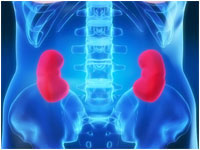Liver
Fibrosis Raises Risk of Kidney Impairment in HIV/HBV Coinfected Patients
on Tenofovir
 |
 |
 |
 |
| SUMMARY:
HIV/HBV coinfected people with advanced
fibrosis are more likely to experience impaired kidney function
while taking tenofovir
(Viread, also in the Truvada
and Atripla
combination pills), according to a poster presented at the
18th Conference on Retroviruses and Opportunistic Infection
(CROI 2011) last month in Boston.
Investigators recommended that coinfected patients with stage
F3 or high fibrosis should therefore receive more frequent
kidney function monitoring. |
|
 |
 |
 |
 |
By
Liz Highleyman
 Tenofovir
has good antiviral activity against both HIV
and hepatitis B virus (HBV), so treatment
guidelines recommend it as a preferred antiretroviral option for people
with HIV/HBV coinfection. But
tenofovir has been shown to cause kidney toxicity in susceptible individuals.
Tenofovir
has good antiviral activity against both HIV
and hepatitis B virus (HBV), so treatment
guidelines recommend it as a preferred antiretroviral option for people
with HIV/HBV coinfection. But
tenofovir has been shown to cause kidney toxicity in susceptible individuals.
Anders Boyd,
K. Lacombe, and colleagues conducted a study to assess kidney impairment
and its association with liver disease in HIV/HBV coinfected people.
Unlike many antiretroviral drugs, tenofovir is mainly processed by the
kidneys, rather than the liver. Nevertheless, liver damage can lead
to impaired blood flow and buildup of toxins that can have a detrimental
effect on kidney function.
This analysis included 137 treatment-experienced patients enrolled in
the French HIV-HBV Cohort Study between 2002 and 2006 who started tenofovir
and used the drug for at least 6 months (mean 32 months). Nearly 90%
of participants were men and the average age was about 42 years.
The researchers looked at creatinine clearance, a laboratory measure
of kidney function, at the time of tenofovir initiation and every 6
months thereafter. Creatinine clearance levels were averaged for each
6-month interval. They estimated changes over time, adjusting for factors
including age, sex, race, HIV viral load, CD4 cell count, and use of
protease inhibitors.
Mild kidney function impairment was defined as an estimated glomerular
filtration rate (eGFR, using the CKD-EPI equation) < 80, with severe
impairment < 50. Median eGFR was 99.3 at the time of tenofovir initiation.
Liver fibrosis stage was estimated using Fibrometer scores derived from
a set of biomarker measurements. Patients were classified as having
either absent-to-moderate fibrosis (equivalent to Metavir stages F0-F2;
96 patients) or advanced fibrosis (stages F3-F4; 41 patients).
Results
 |
Overall,
average eGFR was 97.1 after 12 months on tenofovir, 98.6 after 24
months, and 95.3 after 36 months. |
 |
Patients
with higher fibrosis scores when they started tenofovir experienced
"much steeper" declines in creatinine clearance, with
maximum average eGFR decreases of -6.3 after 18 months and -4.5
after 36 months. |
 |
No
such decline was seen among patients with low baseline fibrosis
scores, with average changes of +0.6 after 18 months and -0.8 after
36 months. |
 |
Significant
differences between the mild and advanced fibrosis groups were observed
at 12, 18, and 24 months after starting tenofovir. |
 |
56
people transitioned from normal to mildly impaired kidney function
during follow-up. |
 |
In
a multivariate analysis, patients with F3-F4 fibrosis had a 3.74-fold
higher risk of developing mild kidney impairment than people with
lower fibrosis scores, after adjusting for other factors. |
 |
Participants
who went from normal to impaired kidney function spent an average
of 8.6 months with creatinine clearance < 80. |
Based on
these findings, the researchers concluded, "HIV/HBV coinfected
patients treated with [tenofovir] are at higher risk of renal impairment
when exhibiting high liver fibrosis level (> F3), thereby
warranting a closer follow-up of [creatinine clearance] in this patient
population."
Investigator affiliations: INSERM UMR S707, Paris, France; Hosp St
Antoine, Paris, France; Univ Pierre and Marie Curie, Paris, France;
Hosp St Louis, Paris, France; Hospices Civils de Lyon, France.
3/18/11
Reference
K Lacombe, Anders Boyd, E Lasnier, et al. Significant Liver Fibrosis
Is an Independent Risk Factor of Renal Impairment in HIV/HBV Co-infected
Patients Treated with TDF: Results of a 3-Year Cohort Study. 18th Conference
on Retroviruses and Opportunistic Infections (CROI 2011). Boston. February
27-March 2, 2011. Abstract
977.
 Tenofovir
has good antiviral activity against both HIV
and hepatitis B virus (HBV), so treatment
guidelines recommend it as a preferred antiretroviral option for people
with HIV/HBV coinfection. But
tenofovir has been shown to cause kidney toxicity in susceptible individuals.
Tenofovir
has good antiviral activity against both HIV
and hepatitis B virus (HBV), so treatment
guidelines recommend it as a preferred antiretroviral option for people
with HIV/HBV coinfection. But
tenofovir has been shown to cause kidney toxicity in susceptible individuals.